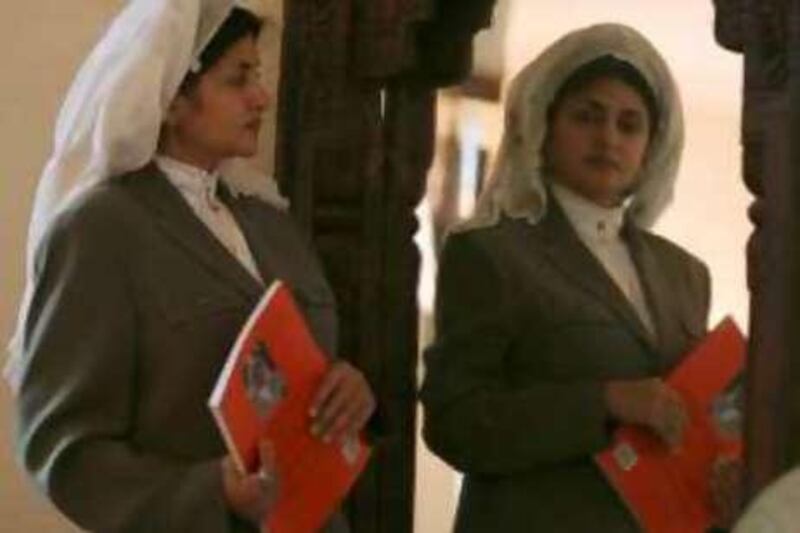RIYADH // Two outspoken Saudi activists who face restrictions from their government have recently been honoured with international awards. Abdul Rahman al Lahim, a lawyer banned from foreign travel, was one of five winners of this year's Human Rights Defender award given by Human Rights Watch. Separately, Hatoon Ajwad al Fassi, a professor of history who is barred from teaching, was named by the French government to the Order of Academic Palms, which recognises noteworthy academic achievement.
Mr Lahim is the first Saudi lawyer to mount a court challenge to illegal actions by the religious police, also known as the Commission for the Promotion of Virtue and Prevention of Vice. In one pending case, Mr Lahim represents the family of a man allegedly beaten to death by members of the commission for possessing alcohol. Unable to attend the ceremony in London last week, Mr Lahim prepared remarks that were read at the event. "This award is an acknowledgement of the hundreds of human rights activists in Saudi Arabia," he said. "It is also a recognition of the work of brave writers who have spoken against Islamist extremists and their calls for violence."
Christoph Wilcke, a senior researcher on Saudi Arabia at the New York-based Human Rights Watch, said the award recognises that "Lahim fights for the rights of his fellow citizens against arbitrary and unjust rulings. "He is at the forefront of the struggle to put into effect the kind of judicial reforms that King Abdullah has announced." Prior to his law career, Mr Lahim wrote about human rights as a newspaper columnist. He holds a degree in sharia from Imam Muhammad bin Saud University in Riyadh. In 2004, Mr Lahim was the lead defence lawyer for three political reformists who were put on trial after advocating that Saudi Arabia become a constitutional monarchy.
Jailed in late 2004, he was kept in solitary confinement until he and his clients were pardoned by King Abdullah in 2005. Mr Lahim, who received another human rights award this year from the American Bar Association, came to international prominence in 2007 when he took up the appeal of a woman from Qatif in Saudi Arabia's Eastern Province who had been sentenced by a Saudi court to 90 lashings after being gang-raped. Her punishment was for an act that preceded the rape: being in a car alone with a man who was not related to her, which is illegal in Saudi Arabia. An appeals court increased the woman's sentence to 200 lashings and six months in jail. In Dec 2007, King Abdullah set aside the woman's sentence after the case drew international criticism. In a recent interview in his Riyadh office, with walls featuring pictures of famous human right defenders, including Martin Luther King Jr, Mahatma Gandhi and Nelson Mandela, Mr Lahim said he had sued members of the religious police to establish the principle that no one is above the law. Most commission members, he said, "still think that they are above the law. But keeping the pressure on them, especially if some of them are punished, will have a very big effect. It will deter them". The commission recently announced that it was establishing a department to monitor its members' actions.
The Saudi press did not take note of Mr Lahim's award, except for Al Watan columnist Abdullah al Mutairi, who called the lawyer "an important phenomenon in modern Saudi history as he? values human rights awareness". Mr Mutairi said it "is wrong to believe that we are perfect and we'll continue to be perfect, self-praising ourselves and closing off our minds and souls from any criticism that might help us uncover flaws". Neither of Saudi Arabia's two human rights societies publicly welcomed Mr Lahim's award. "I was expecting the [government-appointed] Human Rights Commission to call and congratulate me at the least, but they didn't," he said. The French honour Ms Fassi received gives her the title of Knight in the Order of Academic Palms. Raised in Mecca, Ms Fassi said she learnt to speak French as a child while studying in Lebanon. She has given lectures about Saudi culture to French audiences, including one at the French Embassy in Riyadh, about Maidan Saleh. That is the Saudi site of the pre-Islamic Nabataean culture, which is Ms Fassi's academic speciality. Ms Fassi's doctorate thesis, titled Women in Pre-Islamic Arabia: Nabataea, found that women in this urbanised society, whose capital was at Petra in South Jordan, had a high degree of independence, conducting legal and business activities on their own. This status contrasts with current restrictions on Saudi women, who need a male guardian to obtain a business licence, travel abroad and make contracts. In a recent interview, Ms Fassi, who is an assistant professor at King Saud University, said she had never been told why she had been barred from the classroom since 2000. Ms Fassi, who writes a regular newspaper column and is active in promoting women's rights, said she goes to the university every day even though she cannot lecture. "I'm the only professor in the female section of the department graduated from outside Saudi Arabia," she said, adding that she hopes the French award will have "a positive effect" on her situation. "Just a few months ago," she said, "the king himself initiated bonuses for those who receive international awards." cmurphy@thenational.ae





